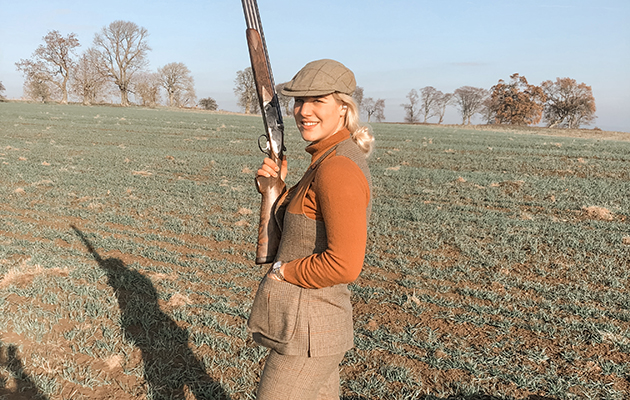Sascha Holland, a one-time vegetarian, has come to appreciate the vital relationship between conservation, wildlife and sustainable eating
A lifelong love of the outdoors and new found passion for cooking saw Sascha Holland discover the connection between sustainable eating, wildlife and conservation. Now she hopes to see more women introduced to this traditionally male-dominated sport.
For more sporting Dianas, seriously sporting ladies offering advice and encouragement, Lucinda Sutcliffe’s passion for fieldsports and underpinned by a firm belief in the ‘field to fork’ philosophy. And Victoria Maloch is following academic and professional paths to represent rural interests in the policy making process.
SASCHA HOLLAND
Having grown up as a vegetarian, my introduction to fieldsports was atypical. I started shooting when I met my now husband 10 years ago. I was not keen at the thought of shooting the game I enjoy watching; my mother produced BBC wildlife documentaries, so I grew up with a love of nature. However, combining my passion for the outdoors with a newly developed passion for cooking, I saw the strong connection between animals, food, nature and conservation. Bracing the elements in diverse weather builds a deep respect for these wild animals, making the resultant meal more rewarding. It is crucial to understand the interplay between humans and thriving wild habitats. The most responsible way of eating meat is to hunt it yourself in a sustainable way. This empathy for Earth’s ecosystems is something that I understand in depth through my geosciences training and it must be taught and practised. In general, I go by the motto: ‘What you shoot you eat’, an important guide in life.

Sascha Holland captained the Oxford University Clay Pigeon Shooting women’s team from 2017-2019.
I shoot game in the season with a roving syndicate, with friends or through Guns on Pegs. We shoot around the south-west (where I grew up) or head to Northumberland, Scotland and Wales for varied topography. Friday evenings during the season are often spent dodging London traffic. I enjoy shooting in diverse groups, varying in age, experience and gender. Having completed my DSC1, I occasionally go deer stalking, too. But my favourite day is the yearly trip to Whitfield for the scenery and the exceptional birds that Stuart [Maughan, headkeeper] displays.
I have two working cocker spaniels – the perfect bridge between gundog and pet (although one took early retirement). My cocker bitch (from Nick Weston) is my sidekick and comes shooting all over the country – she has a penchant for partridges but can still be found dragging back the biggest of cock-birds.
I am also drawn to the wild beat of the bush in South Africa – camping under Africa’s starry nights surrounded by hyenas, leopard and buffalo is an incredible, adrenaline-fuelled experience. I relish game viewing and tracking, and usually incorporate a few days plains game (antelope) management. My most rewarding experience was rising at the crack of dawn and tracking an antelope for four days, which concluded with a clean 390-metre shot off sticks. It certainly caught some attention. Shooting outside the UK brings myriad challenges but a welcome change from cooler UK mornings.
SEARCHING FOR CHAMOIS
My most challenging experience was searching for the elusive chamois in Slovenia. I was told that a cold snap had drawn in and we should expect -27 degrees (a rummage through the ski gear was required). We spent four days in the Julian Alps, trudging through ruthless terrain covered in a metre of powder. It was certainly the most rewarding of trips, which culminated in our local guide preparing the chamois for a hearty dinner.
Over the past few years, my attention has been drawn to clay-pigeon shooting. Again, an atypical transition from game shooting into clay shooting. Starting a PhD at Oxford in 2016, I became involved in the Oxford University Clay Pigeon Shooting Club (OUCPSC), captaining the women’s team from 2017-2019.

She shoots with a roving syndicate during the season across the country.
The main mission was to introduce more women into a historically male-dominated sport and draw people out to the countryside. We increased the number of women in the club significantly and began to win competitions, including the highly competitive Varsity match between Oxford and Cambridge. We now have a clean record of winning Varsity for the past three years and retaining The Field Cup. I have also won two Half Blue sport awards as well as the BASC trophy for High Gun. Our training ground – and the Varsity host – is EJ Churchill, which really is a fantastic ground. We are lucky to have had a dedicated committee behind us over the past four years, which, coupled with our coach, Matt Hance, and motivated students has meant that the club has secured a raft of sponsorships, making the sport more accessible and inclusive than ever before.
Looking forward, it would be great to see more women shooting and more students competing in, for example, CPSA-style competitions. I hope this season will be as much fun as the previous one, even if somewhat reduced.





